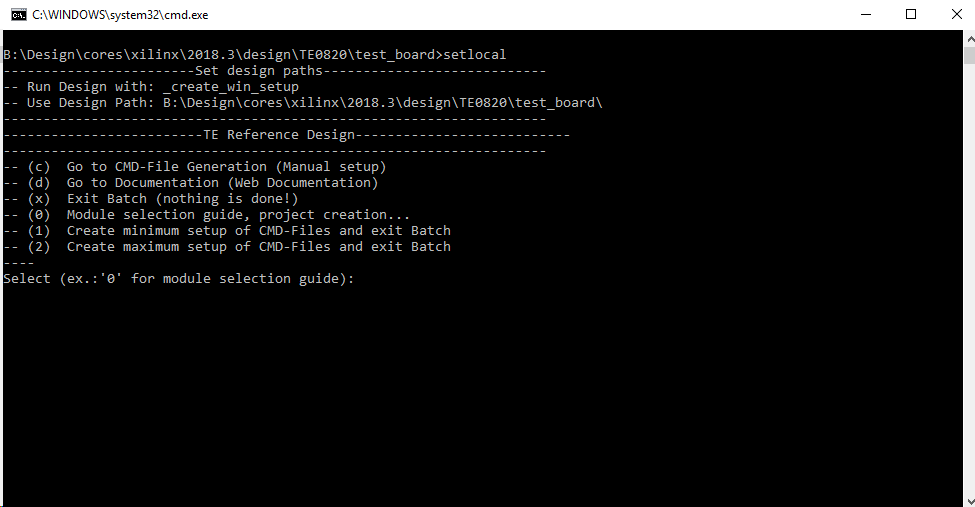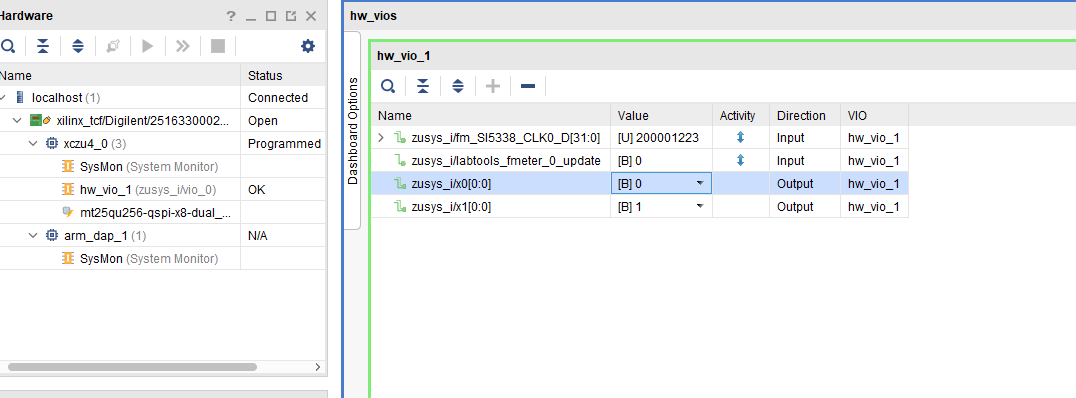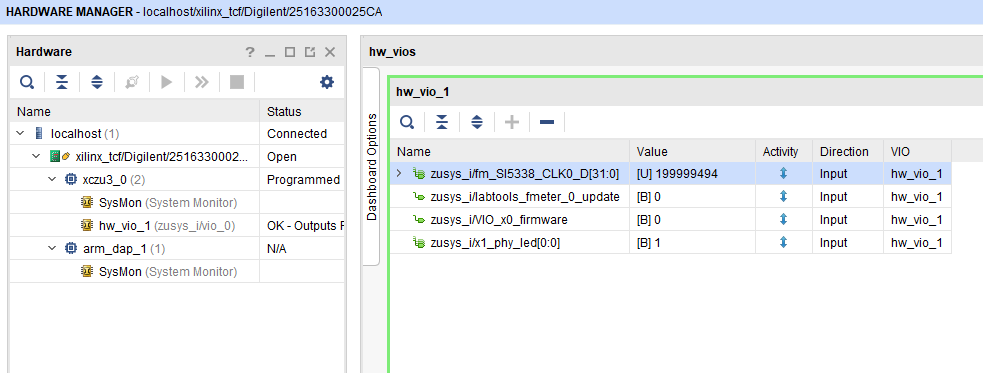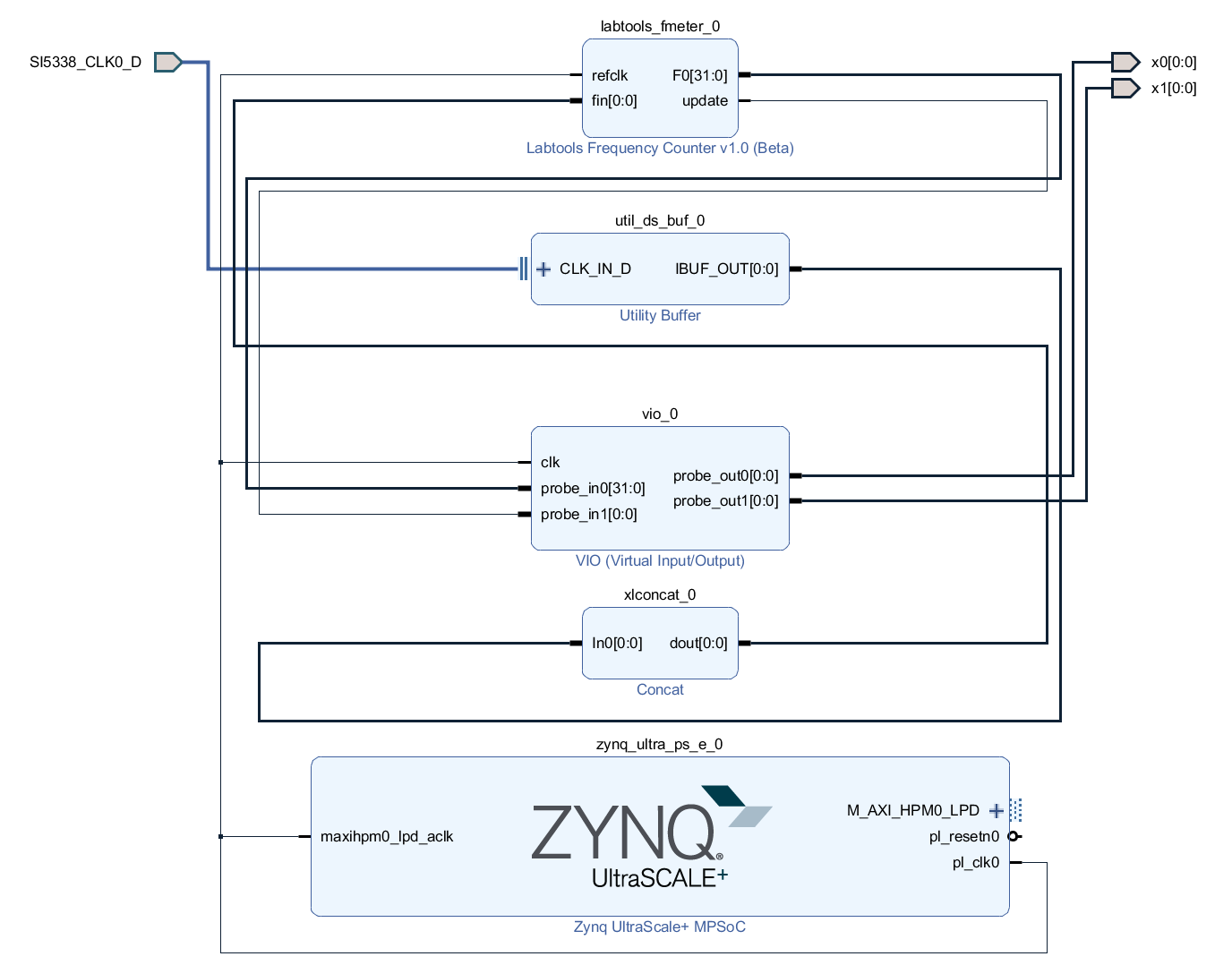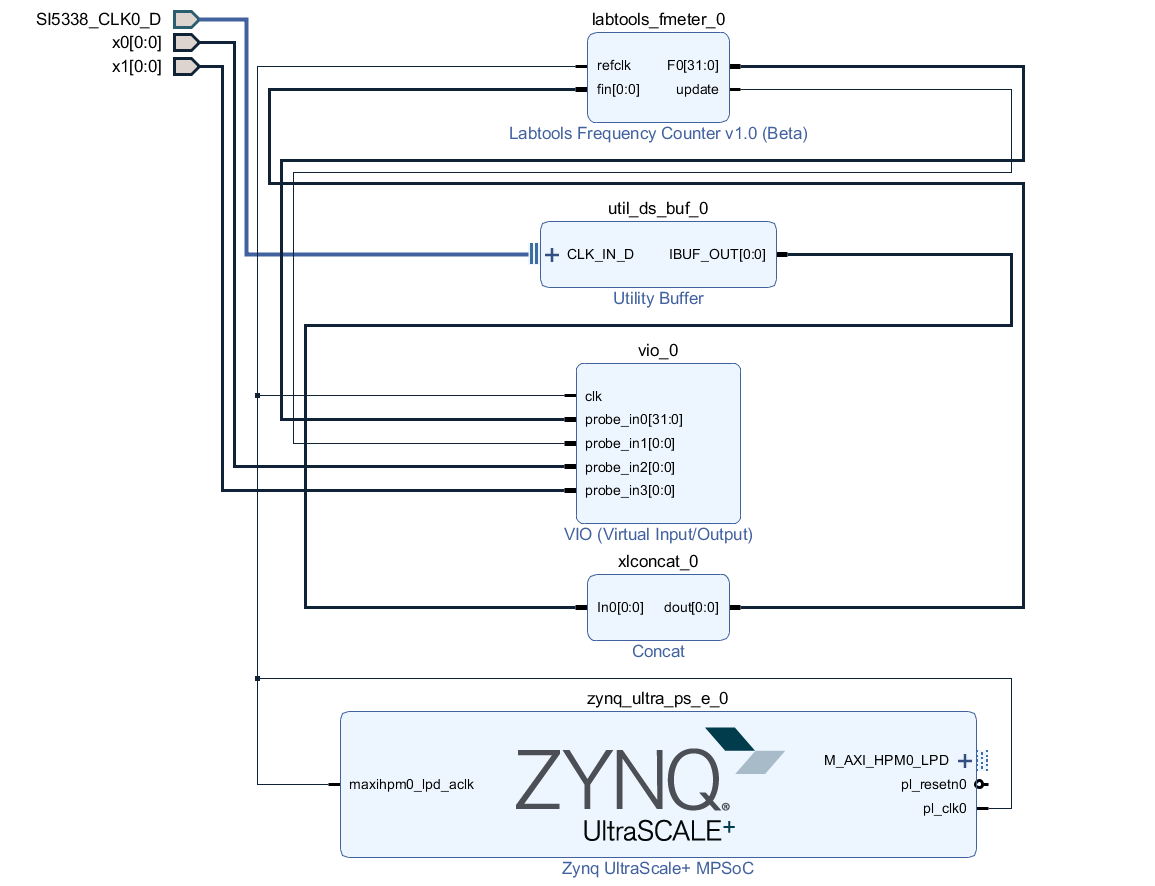Table of contents
Overview
ZynqMP PS Design with Linux Example and simple frequency counter to measure SI5338 Reference CLK with Vivado HW-Manager. Only for use with TEF1002 Carrier.
Wiki Resources page: http://trenz.org/te0820-info
Key Features
- Vitis/Vivado 2019.2
- PetaLinux
- PCIe (endpoint)
- SATA
- SD
- ETH
- USB
- I2C
- RTC
- FMeter
- MAC from EEPROM
- User LED (PCB REV03 only)
- Modified FSBL for SI5338 programming
- Special FSBL for QSPI programming
Revision History
| Date | Vivado | Project Built | Authors | Description |
|---|---|---|---|---|
| 2020-03-25 | 2019.2 | TE0820-TD_TEF1002_noprebuilt-vivado_2019.2-build_8_20200325084054.zip TE0820-TD_TEF1002-vivado_2019.2-build_8_20200325084033.zip | Martin Rohrmüller/John Hartfiel |
|
| 2020-02-14 | 2019.2 | TE0820-TD_TEF1002_noprebuilt-vivado_2019.2-build_6_20200217120248.zip TE0820-TD_TEF1002-vivado_2019.2-build_6_20200217120209.zip | Martin Rohrmüller |
|
Release Notes and Know Issues
| Issues | Description | Workaround | To be fixed version |
|---|---|---|---|
| - | - | - | - |
Requirements
Software
| Software | Version | Note |
|---|---|---|
| Vitis | 2019.2 | needed Vivado is included into Vitis installation |
| PetaLinux | 2019.2 | needed |
| SI ClockBuilder Pro | --- | optional |
Hardware
Basic description of TE Board Part Files is available on TE Board Part Files.
Complete List is available on <design name>/board_files/*_board_files.csv
Design supports following modules:
| Module Model | Board Part Short Name | PCB Revision Support | DDR | QSPI Flash | EMMC | Others | Notes |
|---|---|---|---|---|---|---|---|
| Not longer supported by vivado | |||||||
| TE0820-02-02EG-1E | 2eg_1e_1gb | REV02 | 1GB | 64MB | 4GB | NA | NA |
| TE0820-02-02EG-1E3 | 2eg_1e_1gb | REV02 | 1GB | 64MB | 4GB | 2.5 mm connectors | NA |
| TE0820-02-02CG-1E | 2cg_1e_1gb | REV02 | 1GB | 64MB | 4GB | NA | NA |
| TE0820-02-03EG-1E | 3eg_1e_1gb | REV02 | 1GB | 64MB | 4GB | NA | NA |
| TE0820-02-03EG-1E3 | 3eg_1e_1gb | REV02 | 1GB | 64MB | 4GB | 2.5 mm connectors | NA |
| TE0820-02-03CG-1E | 3cg_1e_1gb | REV02 | 1GB | 64MB | 4GB | NA | NA |
| TE0820-02-02EG-1EA | 2eg_1e_1gb | REV02 | 1GB | 128MB | 4GB | NA | NA |
| TE0820-02-02EG-1EL | 2eg_1e_1gb | REV02 | 1GB | 128MB | 4GB | 2.5 mm connectors | NA |
| TE0820-02-02CG-1EA | 2cg_1e_1gb | REV02 | 1GB | 128MB | 4GB | NA | NA |
| TE0820-02-03EG-1EA | 3eg_1e_1gb | REV02 | 1GB | 128MB | 4GB | NA | NA |
| TE0820-02-03EG-1EL | 3eg_1e_1gb | REV02 | 1GB | 128MB | 4GB | 2.5 mm connectors | NA |
| TE0820-02-03CG-1EA | 3cg_1e_1gb | REV02 | 1GB | 128MB | 4GB | NA | NA |
| TE0820-02-04CG-1EA | 4cg_1e_1gb | REV02 | 1GB | 128MB | 4GB | NA | NA |
| TE0820-03-04EV-1EA | 4ev_1e_2gb | REV03 | 2GB | 128MB | 4GB | NA | NA |
| TE0820-03-02CG-1EA | 2cg_1e_2gb | REV03 | 2GB | 128MB | 4GB | NA | NA |
| TE0820-03-02EG-1EA | 2eg_1e_2gb | REV03 | 2GB | 128MB | 4GB | NA | NA |
| TE0820-03-02EG-1EL | 2eg_1e_2gb | REV03 | 2GB | 128MB | 4GB | 2.5 mm connectors | NA |
| TE0820-03-03CG-1EA | 3cg_1e_2gb | REV03 | 2GB | 128MB | 4GB | NA | NA |
| TE0820-03-04CG-1EA | 4cg_1e_2gb | REV03 | 2GB | 128MB | 4GB | NA | NA |
| TE0820-03-03EG-1EA | 3eg_1e_2gb | REV03 | 2GB | 128MB | 4GB | NA | NA |
| TE0820-03-03EG-1EL | 3eg_1e_2gb | REV03 | 2GB | 128MB | 4GB | 2.5 mm connectors | NA |
| TE0820-03-2AI21FA | 2cg_1i_2gb | REV03 | 2GB | 128MB | 8GB | NA | NA |
| TE0820-03-2BE21FL | 2eg_1e_2gb | REV03 | 2GB | 128MB | 8GB | 2.5 mm connectors | NA |
| TE0820-03-3AI210A | 3cg_1i_2gb | REV03 | 2GB | 128MB | 0GB | NA | NA |
| TE0820-03-3BE21FA | 3eg_1e_2gb | REV03 | 2GB | 128MB | 4GB | NA | NA |
| TE0820-03-3BE21FL | 3eg_1e_2gb | REV03 | 2GB | 128MB | 4GB | 2.5 mm connectors | NA |
| TE0820-03-02CG-1ED | 2cg_1e_2gb | REV03 | 2GB | 128MB | 8GB | NA | NA |
| TE0820-03-2AE21FA | 2cg_1e_2gb | REV03 | 2GB | 128MB | 8GB | NA | NA |
| TE0820-03-2BE21FA | 2eg_1e_2gb | REV03 | 2GB | 128MB | 8GB | NA | NA |
| TE0820-03-3AE21FA | 3cg_1e_2gb | REV03 | 2GB | 128MB | 8GB | NA | NA |
| TE0820-03-3AI21FA | 3cg_1i_2gb | REV03 | 2GB | 128MB | 8GB | NA | NA |
| TE0820-03-4AE21FA | 4cg_1e_2gb | REV03 | 2GB | 128MB | 8GB | NA | NA |
| TE0820-03-4DE21FA | 4ev_1e_2gb | REV03 | 2GB | 128MB | 8GB | NA | NA |
| TE0820-03-4DI21FA | 4ev_1i_2gb | REV03 | 2GB | 128MB | 8GB | NA | NA |
Design supports following carriers:
| Carrier Model | Notes |
|---|---|
| TEF1002 |
|
Additional HW Requirements:
| Additional Hardware | Notes |
|---|---|
| USB Cable for JTAG/UART | Check Carrier Board and Programmer for correct typ |
| Cooler | It's recommended to use cooler on ZynqMP device |
Content
For general structure and of the reference design, see Project Delivery - AMD devices.
Design Sources
| Type | Location | Notes |
|---|---|---|
| Vivado | <design name>/block_design <design name>/constraints <design name>/ip_lib | Vivado Project will be generated by TE Scripts |
| Vitis | <design name>/sw_lib | Additional Software Template for Vitis and apps_list.csv with settings automatically for Vitis app generation |
| PetaLinux | <design name>/os/petalinux | PetaLinux template with current configuration |
Additional Sources
| Type | Location | Notes |
|---|---|---|
| SI5338 | <design name>/misc/Si5338 | SI5338 Project with current PLL Configuration |
| init.sh | <design name>/sd/ | Additional Initialization Script for Linux |
Prebuilt
File | File-Extension | Description |
|---|---|---|
| BIF-File | *.bif | File with description to generate Bin-File |
| BIN-File | *.bin | Flash Configuration File with Boot-Image (Zynq-FPGAs) |
| BIT-File | *.bit | FPGA (PL Part) Configuration File |
| DebugProbes-File | *.ltx | Definition File for Vivado/Vivado Labtools Debugging Interface |
| Diverse Reports | --- | Report files in different formats |
| Hardware-Platform-Specification-Files | *.xsa | Exported Vivado Hardware Specification forVitis and PetaLinux |
| LabTools Project-File | *.lpr | Vivado Labtools Project File |
| OS-Image | *.ub | Image with Linux Kernel (On Petalinux optional with Devicetree and RAM-Disk) |
| Software-Application-File | *.elf | Software Application for Zynq or MicroBlaze Processor Systems |
Download
Reference Design is only usable with the specified Vivado/SDK/PetaLinux/SDx version. Do never use different Versions of Xilinx Software for the same Project.
Reference Design is available on:
Design Flow
Reference Design is available with and without prebuilt files. It's recommended to use TE prebuilt files for first launch.
Trenz Electronic provides a tcl based built environment based on Xilinx Design Flow.
See also:
- AMD Development Tools#XilinxSoftware-BasicUserGuides
- Vivado Projects - TE Reference Design
- Project Delivery.
The Trenz Electronic FPGA Reference Designs are TCL-script based project. Command files for execution will be generated with "_create_win_setup.cmd" on Windows OS and "_create_linux_setup.sh" on Linux OS.
TE Scripts are only needed to generate the vivado project, all other additional steps are optional and can also executed by Xilinx Vivado/SDK GUI. For currently Scripts limitations on Win and Linux OS see: Project Delivery Currently limitations of functionality
- _create_win_setup.cmd/_create_linux_setup.sh and follow instructions on shell:
- Press 0 and enter to start "Module Selection Guide"
- (optional Win OS) Generate Virtual Drive or use short directory for the reference design (for example x:\<design name>)
- Create Project (follow instruction of the product selection guide), settings file will be configured automatically during this process
- (optional for manual changes) Select correct device and Xilinx install path on "design_basic_settings.cmd" and create Vivado project with "vivado_create_project_guimode.cmd"
Note: Select correct one, see also TE Board Part Files
- (optional for manual changes) Select correct device and Xilinx install path on "design_basic_settings.cmd" and create Vivado project with "vivado_create_project_guimode.cmd"
- Create XSA and export to prebuilt folder
- Run on Vivado TCL: TE::hw_build_design -export_prebuilt
Note: Script generate design and export files into \prebuilt\hardware\<short dir>. Use GUI is the same, except file export to prebuilt folder
- Run on Vivado TCL: TE::hw_build_design -export_prebuilt
- Create Linux (bl31.elf, uboot.elf and image.ub) with exported XSA
- XSA is exported to "prebuilt\hardware\<short name>"
Note: HW Export from Vivado GUI create another path as default workspace. - Create Linux images on VM, see PetaLinux KICKstart
- Use TE Template from "/os/petalinux"
- XSA is exported to "prebuilt\hardware\<short name>"
- Add Linux files (bl31.elf, uboot.elf and image.ub) to prebuilt folder
- "prebuilt\os\petalinux\<DDR size>" or "prebuilt\os\petalinux\<short name>"
Notes: Scripts select "prebuilt\os\petalinux\<short name>", if exist, otherwise "prebuilt\os\petalinux\<DDR size"
- "prebuilt\os\petalinux\<DDR size>" or "prebuilt\os\petalinux\<short name>"
- Generate Programming Files with Vitis
- Run on Vivado TCL: TE::sw_run_vitis -all
Note: Depending of PC performance this can take several minutes. Scripts generate applications and bootable files, which are defined in "sw_lib\apps_list.csv" and open Vitis - (alternative) Start Vitis with Vivado GUI or start with TE Scripts on Vivado TCL: TE::sw_run_vitis
Note: TCL scripts generate also platform project, this must be done manuelly in case GUI is used. See Vitis
- Run on Vivado TCL: TE::sw_run_vitis -all
Launch
Programming
Check Module and Carrier TRMs for proper HW configuration before you try any design.
Xilinx documentation for programming and debugging: Vivado/SDK/SDSoC-Xilinx Software Programming and Debugging.
Note: Depending on CPLD Firmware and Boot Mode settings, QSPI boot with Linux image on SD or complete SD Boot is possible.
Get prebuilt boot binaries
- _create_win_setup.cmd/_create_linux_setup.sh and follow instructions on shell:
- Press 0 and enter to start "Module Selection Guide"
- Select assembly version
- Validate selection
- Select Create and open delivery binary folder
Note: Folder (<project foler>/_binaries_<Artikel Name>) with subfolder (boot_<app name>) for different applications will be generated
QSPI
Optional for Boot.bin on QSPI Flash and image.ub on SD.
- Connect JTAG and power on carrier with module
- Open Vivado Project with "vivado_open_existing_project_guimode.cmd" or if not created, create with "vivado_create_project_guimode.cmd"
- Type on Vivado TCL Console: TE::pr_program_flash_binfile -swapp u-boot
Note: To program with SDK/Vivado GUI, use special FSBL (zynqmp_fsbl_flash) on setup
optional "TE::pr_program_flash_binfile -swapp hello_te0820" possible - Copy image.ub on SD-Card
- use files from (<project foler>/_binaries_<Artikel Name>)/boot_linux from generated binary folder,see: Get prebuilt boot binaries
- or use prebuilt file location, see <design_name>/prebuilt/readme_file_location.txt
- Insert SD-Card
SD
Use this description for CPLD Firmware with SD Boot selectable.
- Copy image.ub and Boot.bin on SD-Card.
- For correct prebuilt file location, see <design_name>/prebuilt/readme_file_location.txt
- Insert SD-Card in SD-Slot.
JTAG
Not used on this Example.
Usage
- Prepare HW like described on section TEF1002 Getting Started
- for PCIe insert TEF1002 in PCIe slot and connect PC PCIe 6 pin power connector
- Connect JTAG/UART USB
- Connect SATA device
- Select Boot Mode (S3-1)
- Power On PCB
Note: 1. ZynqMP Boot ROM loads PMU Firmware and FSBL from SD/QSPI Flash into OCM, 2. FSBL loads ATF(bl31.elf) and U-boot from SD into DDR, 3. U-boot load Linux from SD into DDR
Linux
- Open Serial Console (e.g. putty)
- Speed: 115200
- COM Port: Win OS, see device manager, Linux OS see dmesg |grep tty (UART is *USB1)
- Linux Console:
Note: Wait until Linux boot finished For Linux Login use:- User Name: root
- Password: root
- You can use Linux shell now.
- I2C 0 Bus type: i2cdetect -y -r 0
- RTC check: dmesg | grep rtc
- ETH0 works with udhcpc
- USB type "lsusb" or connect USB2.0 device
- SATA device
- dmesg | grep -i sata | grep 'link up'
- fdisk -l /dev/sd*
- partitions are mounted to /run/media/sdXY: df -h
- Option Features
- Webserver to get access to Zynq
- insert IP on web browser to start web interface
- init.sh scripts
- add init.sh script on SD, content will be load automatically on startup (template included in ./misc/SD)
- Webserver to get access to Zynq
Vivado HW Manager
SI5338_CLK0 Counter:
- Open Vivado HW-Manager and add VIO signal to dashboard (*.ltx located on prebuilt folder).
- Set radix from VIO signals to unsigned integer.
Note: Frequency Counter is inaccurate and displayed unit is Hz
- Set radix from VIO signals to unsigned integer.
SI5338 CLK is configured to 200MHz by default.
PCB REV03 Design:
- User LED, see: TE0820 CPLD#LED
PCB REV01, REV02 Design:
- PHY LEDS, see: TE0820-REV01_REV02 CPLD#X0/X1Pin
- CPLD Firmware, see: TE0820-REV01_REV02 CPLD#X0/X1Pin
System Design - Vivado
Block Design
PCB REV03
PCB REV01 REV02
PS Interfaces
Activated interfaces:
| Type | Note |
|---|---|
| DDR | |
| PCIe | GTR Lane0, 100MHz endpoint, RESET# MIO33 |
| SATA | GTR Lane3, 125MHz |
| QSPI | MIO |
| SD0 | MIO |
| SD1 | MIO |
| I2C0 | MIO |
| UART0 | MIO |
| GPIO0 | MIO |
| SWDT0..1 | |
| TTC0..3 | |
| GEM3 | MIO |
| USB0 | MIO, USB2 only |
Constrains
Basic module constrains
set_property BITSTREAM.GENERAL.COMPRESS TRUE [current_design] set_property BITSTREAM.CONFIG.UNUSEDPIN PULLNONE [current_design
Design specific constrain
set_property PACKAGE_PIN K9 [get_ports {SI5338_CLK0_D_clk_p[0]}]
set_property IOSTANDARD LVDS [get_ports {SI5338_CLK0_D_clk_p[0]}]
set_property DIFF_TERM TRUE [get_ports {SI5338_CLK0_D_clk_p[0]}]
set_property PACKAGE_PIN H1 [get_ports {x0[0]}]
set_property IOSTANDARD LVCMOS18 [get_ports {x0[0]}]
set_property PACKAGE_PIN J1 [get_ports {x1[0]}]
set_property IOSTANDARD LVCMOS18 [get_ports {x1[0]}]
Software Design - Vitis
For SDK project creation, follow instructions from:
Application
Template location: ./sw_lib/sw_apps/
zynqmp_fsbl
TE modified 2019.2 FSBL
General:
- Modified Files: xfsbl_main.c, xfsbl_hooks.h/.c, xfsbl_board.h/.c(search for 'TE Mod' on source code)
- Add Files: te_xfsbl_hooks.h/.c (for hooks and board)\n\
- General Changes:
- Display FSBL Banner and Device Name
Module Specific:
- Add Files: all TE Files start with te_*
- Si5338 Configuration
- ETH+OTG Reset over MIO
zynqmp_fsbl_flash
TE modified 2019.2 FSBL
General:
- Modified Files: xfsbl_initialisation.c, xfsbl_hw.h, xfsbl_handoff.c, xfsbl_main.c
- General Changes:
- Display FSBL Banner
- Set FSBL Boot Mode to JTAG
- Disable Memory initialisation
zynqmp_pmufw
Xilinx default PMU firmware.
hello_te0820
Hello TE0820 is a Xilinx Hello World example as endless loop instead of one console output.
u-boot
U-Boot.elf is generated with PetaLinux. SDK/HSI is used to generate Boot.bin.
Software Design - PetaLinux
For PetaLinux installation and project creation, follow instructions from:
Config
Start with petalinux-config or petalinux-config --get-hw-description
Changes:
- CONFIG_SUBSYSTEM_PRIMARY_SD_PSU_SD_1_SELECT=y
- CONFIG_SUBSYSTEM_ETHERNET_PSU_ETHERNET_3_MAC=""
U-Boot
Start with petalinux-config -c u-boot
Changes:
CONFIG_ENV_IS_NOWHERE=y
# CONFIG_ENV_IS_IN_SPI_FLASH is not set
CONFIG_I2C_EEPROM=y
CONFIG_ZYNQ_GEM_I2C_MAC_OFFSET=0xFA
CONFIG_SYS_I2C_EEPROM_ADDR=0x50
CONFIG_SYS_I2C_EEPROM_BUS=0
CONFIG_SYS_EEPROM_SIZE=256
CONFIG_SYS_EEPROM_PAGE_WRITE_BITS=0
CONFIG_SYS_EEPROM_PAGE_WRITE_DELAY_MS=0
CONFIG_SYS_I2C_EEPROM_ADDR_LEN=1
CONFIG_SYS_I2C_EEPROM_ADDR_OVERFLOW=0
Change platform-top.h:
Device Tree
/include/ "system-conf.dtsi"
/ {
chosen {
xlnx,eeprom = &eeprom;
};
};
/* SDIO */
&sdhci1 {
disable-wp;
no-1-8-v;
};
/* ETH PHY */
&gem3 {
status = "okay";
ethernet_phy0: ethernet-phy@0 {
compatible = "marvell,88e1510";
device_type = "ethernet-phy";
reg = <1>;
};
};
/* USB 2.0 */
/* USB */
&dwc3_0 {
status = "okay";
dr_mode = "host";
maximum-speed = "high-speed";
/delete-property/phy-names;
/delete-property/phys;
/delete-property/snps,usb3_lpm_capable;
snps,dis_u2_susphy_quirk;
snps,dis_u3_susphy_quirk;
};
&usb0 {
status = "okay";
/delete-property/ clocks;
/delete-property/ clock-names;
clocks = <0x3 0x20>;
clock-names = "bus_clk";
};
/* QSPI PHY */
&qspi {
#address-cells = <1>;
#size-cells = <0>;
status = "okay";
flash0: flash@0 {
compatible = "jedec,spi-nor";
reg = <0x0>;
#address-cells = <1>;
#size-cells = <1>;
};
};
&i2c0 {
eeprom: eeprom@50 {
compatible = "atmel,24c08";
reg = <0x50>;
};
};
Kernel
Start with petalinux-config -c kernel
Changes:
CONFIG_CPU_IDLE is not set (only needed to fix JTAG Debug issue)
CONFIG_CPU_FREQ is not set (only needed to fix JTAG Debug issue)
- CONFIG_EDAC_CORTEX_ARM64=y
Rootfs
Start with petalinux-config -c rootfs
Changes:
- CONFIG_i2c-tools=y
- CONFIG_busybox-httpd=y (for web server app)
- CONFIG_packagegroup-petalinux-utils(util-linux,cpufrequtils,bridge-utils,mtd-utils,usbutils,pciutils,canutils,i2c-tools,smartmontools,e2fsprogs)
- CONFIG_e2fsprogs=y (filesystems maintanace)
- CONFIG_e2fsprogs-dev=y (for filesystems maintanace)
- CONFIG_e2fsprogs-mke2fs=y (filesystems maintanace)
- CONFIG_e2fsprogs-dbg=y (filesystems maintanace)
- CONFIG_e2fsprogs-resize2fs=y (filesystems maintanace)
- CONFIG_e2fsprogs-tune2fs=y (filesystems maintanace)
- CONFIG_libss=y (for filesystems maintanace)
- CONFIG_libcomerr=y (for filesystems maintanace)
- CONFIG_libext2fs=y (filesystems maintanace)
- CONFIG_libe2p=y (filesystems maintanace)
- CONFIG_e2fsprogs-badblocks=y (filesystems maintanace)
Applications
startup
Script App to load init.sh from SD Card if available.
See: \os\petalinux\project-spec\meta-user\recipes-apps\startup\files
webfwu
Webserver application accemble for Zynq access. Need busybox-httpd
Additional Software
SI5338
File location <design name>/misc/Si5338/Si5338-*.slabtimeproj
General documentation how you work with these project will be available on Si5338
Appx. A: Change History and Legal Notices
Document Change History
To get content of older revision got to "Change History" of this page and select older document revision number.
| Date | Document Revision | Authors | Description |
|---|---|---|---|
| |||
| 2020-03-11 | v.6 | Martin Rohrmüller |
|
Legal Notices
Data Privacy
Please also note our data protection declaration at https://www.trenz-electronic.de/en/Data-protection-Privacy
Document Warranty
The material contained in this document is provided “as is” and is subject to being changed at any time without notice. Trenz Electronic does not warrant the accuracy and completeness of the materials in this document. Further, to the maximum extent permitted by applicable law, Trenz Electronic disclaims all warranties, either express or implied, with regard to this document and any information contained herein, including but not limited to the implied warranties of merchantability, fitness for a particular purpose or non infringement of intellectual property. Trenz Electronic shall not be liable for errors or for incidental or consequential damages in connection with the furnishing, use, or performance of this document or of any information contained herein.
Limitation of Liability
In no event will Trenz Electronic, its suppliers, or other third parties mentioned in this document be liable for any damages whatsoever (including, without limitation, those resulting from lost profits, lost data or business interruption) arising out of the use, inability to use, or the results of use of this document, any documents linked to this document, or the materials or information contained at any or all such documents. If your use of the materials or information from this document results in the need for servicing, repair or correction of equipment or data, you assume all costs thereof.
Copyright Notice
No part of this manual may be reproduced in any form or by any means (including electronic storage and retrieval or translation into a foreign language) without prior agreement and written consent from Trenz Electronic.
Technology Licenses
The hardware / firmware / software described in this document are furnished under a license and may be used /modified / copied only in accordance with the terms of such license.
Environmental Protection
To confront directly with the responsibility toward the environment, the global community and eventually also oneself. Such a resolution should be integral part not only of everybody's life. Also enterprises shall be conscious of their social responsibility and contribute to the preservation of our common living space. That is why Trenz Electronic invests in the protection of our Environment.
REACH, RoHS and WEEE
REACH
Trenz Electronic is a manufacturer and a distributor of electronic products. It is therefore a so called downstream user in the sense of REACH. The products we supply to you are solely non-chemical products (goods). Moreover and under normal and reasonably foreseeable circumstances of application, the goods supplied to you shall not release any substance. For that, Trenz Electronic is obliged to neither register nor to provide safety data sheet. According to present knowledge and to best of our knowledge, no SVHC (Substances of Very High Concern) on the Candidate List are contained in our products. Furthermore, we will immediately and unsolicited inform our customers in compliance with REACH - Article 33 if any substance present in our goods (above a concentration of 0,1 % weight by weight) will be classified as SVHC by the European Chemicals Agency (ECHA).
RoHS
Trenz Electronic GmbH herewith declares that all its products are developed, manufactured and distributed RoHS compliant.
WEEE
Information for users within the European Union in accordance with Directive 2002/96/EC of the European Parliament and of the Council of 27 January 2003 on waste electrical and electronic equipment (WEEE).
Users of electrical and electronic equipment in private households are required not to dispose of waste electrical and electronic equipment as unsorted municipal waste and to collect such waste electrical and electronic equipment separately. By the 13 August 2005, Member States shall have ensured that systems are set up allowing final holders and distributors to return waste electrical and electronic equipment at least free of charge. Member States shall ensure the availability and accessibility of the necessary collection facilities. Separate collection is the precondition to ensure specific treatment and recycling of waste electrical and electronic equipment and is necessary to achieve the chosen level of protection of human health and the environment in the European Union. Consumers have to actively contribute to the success of such collection and the return of waste electrical and electronic equipment. Presence of hazardous substances in electrical and electronic equipment results in potential effects on the environment and human health. The symbol consisting of the crossed-out wheeled bin indicates separate collection for waste electrical and electronic equipment.
Trenz Electronic is registered under WEEE-Reg.-Nr. DE97922676.
